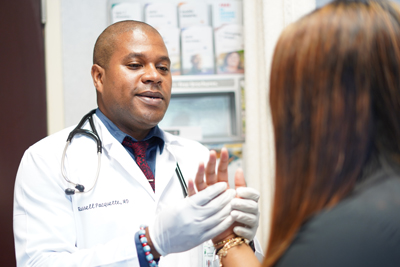The Lowdown On Flare Ups
Acute pain and inflammation is common even if your chronic arthritis is well-managed
A little unpredictability can be fun. Unless there is pain involved.
If you suffer from any type of arthritis, an inflammation of the joints, then you have probably encountered that moment when everything seemed under control, and then boom—pain, tenderness, warmth and swelling.
That boom is called an arthritis flare.
“A flare is an acute episode of pain and inflammation,” explains Russell Pacquette, MD, of St. Joseph’s/Candler Primary Care on Eisenhower. “Arthritis flares are quite common and they can be troublesome, but they’re usually temporary.”

Causes of flares can vary depending on the type of arthritis. Triggers for osteoarthritis (age-related wear and tear) flares can include anything from bone spurs to an infection to cold weather or a change in barometric pressure. Infection can also be a factor in rheumatoid arthritis, which is an autoimmune disease, but so can overexertion. Stress can be a trigger in most types of arthritis.
“Certainly, causes may overlap, and sometimes it is difficult to tell exactly what caused a flare,” Dr. Pacquette says.
More troubling to patients, though, may be the difficulty in knowing when a flare will happen.
“Flares may happen at random times without any trigger, so recognizing early signs is important,” Dr. Pacquette says. “Symptoms usually include increased pain and swelling and increased stiffness. For smaller flares, usually nonsteroidal anti-inflammatories such as ibuprofen may be helpful. Applying cold packs to the affected joints usually also helps. Severe flares may require sometimes oral or injectable steroids. These of course would have to be prescribed by your doctor.”
While flares are always unwelcome and can be unnerving, they don’t mean that you aren’t managing your arthritis properly. But it is important to follow your physician’s plan of care and to take your medications as prescribed. Also, Dr. Pacquette urges flare sufferers to balance their rest with simple exercise.
“It is important to rest, but it’s also important to not stop all activity,” he says. “Whenever possible perform aerobic and strengthening exercises. Maintaining a healthy weight and not smoking is also helpful. These kinds of nonpharmacologic interventions can generally be followed for all types of arthritis and are a mainstay of treatment.”